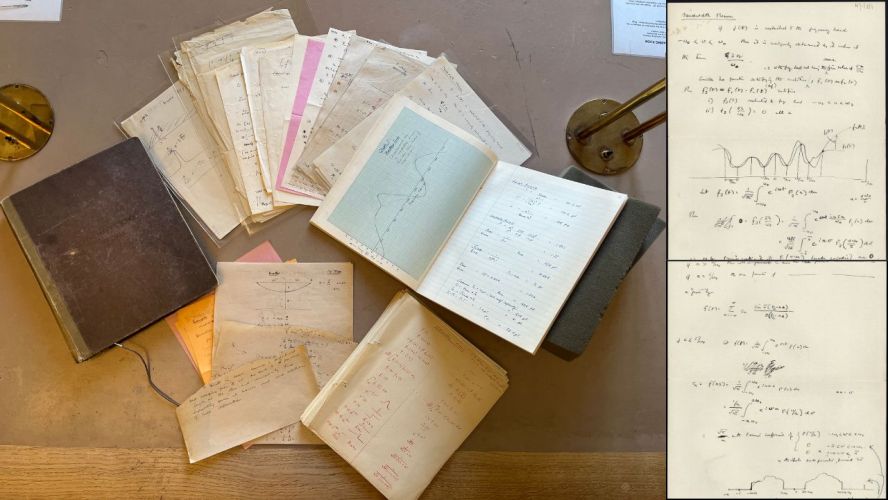Alan Turing's 'Delilah' papers saved for the nation

A rare and significant archive of Alan Turing's unpublished Second World War papers has found a permanent home at King's.
Following his ground-breaking work on the Enigma machines at Bletchley Park, in 1943 Turing (KC 1931) turned to building a portable voice encoder for short-distance transmission to be used in military operations. The project was code-named 'Delilah'. With the help of electrical engineer Donald Bayley they built a single prototype to encipher a speech for transmission via a telephone line or VHF radio link with accurate and complete reproduction at the other end.
During the development work at Hanslope Park, now the home of HMGCC (His Majesty’s Government Communications Centre), Turing and Bayley kept a logbook of their experimental results. Bayley also kept handwritten notes of lectures Turing gave to interested Hanslope Park engineers about the mathematics behind the project, along with loose pages of diagrams, calculations, explanations, and other electronic and mathematical theorems and problems.
Unpublished evidence of Alan Turing's work has rarely survived, and the papers were at risk of leaving the country unless a UK institution or individual tried to purchase the items and retain them in the UK for the public to enjoy. The notebooks were saved thanks to a major donation from trading firm XTX Markets, Friends of the Nations' Libraries, and further support from the National Heritage Memorial Fund and King's College.
"It’s brilliant news that the Friends of the Nations’ Libraries charity has successfully campaigned to save Alan Turing’s vital notebooks. Turing was not only a pioneering figure in science and mathematics, but also a national hero” said Secretary of State for Culture Media and Sport Lisa Nandy.
“This is a powerful example of what can be achieved when private and charitable sectors come together. After a government export ban was placed on the notebooks, this collaboration has ensured that these treasures will be preserved for years to come.”
The papers consist of more than 40 pages of unpublished ‘Delilah’ project notes written by Alan Turing and Donald Bayley and are the most important archive of Turing material to come to auction. They will join the largest collection of Turing-related documents at King’s College, Cambridge. Once digitised they will become part of the Turing Papers online archive, freely available to scholars and students around the world.
Alex Gerko, Founder and co-CEO, XTX Markets said, “The 'Delilah’ papers are a unique collection of notes from one of the nation’s greatest mathematicians. It’s important that this archive remains in the UK and is made publicly accessible, so we are thrilled to be part of that effort.”
Alan Turing arrived at King’s as an undergraduate in 1931 and was made a Fellow in 1935, maintaining a lifelong connection with the College. The Turing Archive was founded in 1960 following a donation of his papers by his mother, Sara Turing.
“Alan Turing’s work laid the foundations of computer science, artificial intelligence and much of our modern world. We are honoured to house the ‘Delilah’ papers at King’s and are deeply grateful to our partners in this endeavour, particularly XTX Markets, Alex Gerko, and the Friends of the Nations’ Libraries,” commented King’s College Provost Gillian Tett.
Geordie Greig, Chair of Friends of the Nations' Libraries said: “This extraordinary private donation means that crucial papers written by one of Britain’s geniuses have been saved and can be studied at Cambridge. It is a wonderful act of generosity by XTX Markets and Alex Gerko and we are delighted to have played a part in bringing together this brilliant collaboration between XTX Markets and King’s College, a centre of academic excellence to save our heritage."
